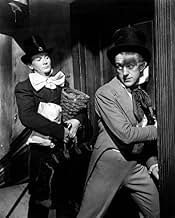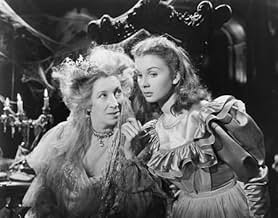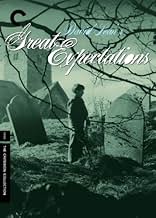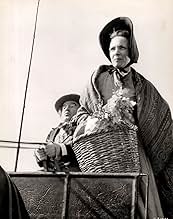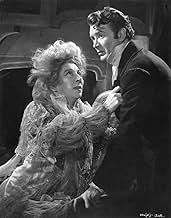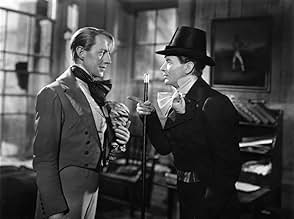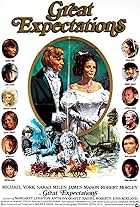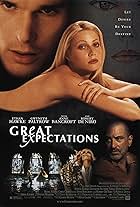A humble orphan boy in 1810s Kent is given the opportunity to go to London and become a gentleman, with the help of an unknown benefactor.A humble orphan boy in 1810s Kent is given the opportunity to go to London and become a gentleman, with the help of an unknown benefactor.A humble orphan boy in 1810s Kent is given the opportunity to go to London and become a gentleman, with the help of an unknown benefactor.
- Won 2 Oscars
- 11 wins & 4 nominations total
Tony Wager
- Young Pip
- (as Anthony Wager)
O.B. Clarence
- The Aged Parent
- (as O. B. Clarence)
Featured reviews
When David Lean directed Great Expectations, he used black and white, even though color was available. From the very first scene, you see that the black and white brings out a quality in the film, that wouldn't have been achieved with color. The black and white makes the film seem simpler than it really is. Great Expectations is a film, which ends very nicely for the characters, but their journeys throughout the film are not.
Pip sees himself for the rude snob he became, and Estella prides herself for being a heartless, ruthless bitch (for lack of a better word), and Miss Havisham is cold, and simply out to destroy men. The only person in this film who is not arrogant, or evil is the simple Joe.
I am far from a film expert. Infact, I only watched this movie because I am studying Great Expectations at school. However, after hours of in-depth discussion, there is so much more to this film than meets the eye. My favorite scenes are those in the first quarter of an hour. Lean's use of Silhouettes gives the search for the two escaped convicts a feel of war, and creates an atmosphere of tension very well. It also introduces the key characters in the story excellently.
As far as the story goes, I found it much easier on the head to watch than the book was to read. While it wasn't close in length to books i've read before (I think it's shorter than my little brother's "Harry Potter" books), it took me close to 30 hours to read. The movie compacts the majority of the book into 2 hours of film. The exclusion of characters like Orlick I have no problem with, as they are nearly completely irrelevant to the story. Lean explains the death of Pip's sister in less than 10 seconds, while the book takes somewhere in the region of 10 pages.
The acting is excellent. Alec Guinness was the only actor I had heard of, and that was only thanks to George Lucas. John Mills was interesting to watch, and after seeing the movie, I didn't know weather to like Pip for how he ended up, or to see him for the nasty person he had changed into (and come back from).
Only when watching it for the second time, did i realise the thought behind the direction. When Magwitch reappears, the atmosphere from their first meeting is created exactly; even the wind sounds the same. The sets were also incredible, and remade 19th century England perfectly. Ms. Havisham's `Statis House' was particularly memorable for me, as it is exactly how I pictured it from reading.
David Lean's Great Expectations set a benchmark in 1946 for great movies. It was nominated and won several Oscars, and is still enjoyed today. Every aspect of this film was enjoyable, it tells a great story, and if you look closer, you will appreciate the art of film making a little more, as I have.
Pip sees himself for the rude snob he became, and Estella prides herself for being a heartless, ruthless bitch (for lack of a better word), and Miss Havisham is cold, and simply out to destroy men. The only person in this film who is not arrogant, or evil is the simple Joe.
I am far from a film expert. Infact, I only watched this movie because I am studying Great Expectations at school. However, after hours of in-depth discussion, there is so much more to this film than meets the eye. My favorite scenes are those in the first quarter of an hour. Lean's use of Silhouettes gives the search for the two escaped convicts a feel of war, and creates an atmosphere of tension very well. It also introduces the key characters in the story excellently.
As far as the story goes, I found it much easier on the head to watch than the book was to read. While it wasn't close in length to books i've read before (I think it's shorter than my little brother's "Harry Potter" books), it took me close to 30 hours to read. The movie compacts the majority of the book into 2 hours of film. The exclusion of characters like Orlick I have no problem with, as they are nearly completely irrelevant to the story. Lean explains the death of Pip's sister in less than 10 seconds, while the book takes somewhere in the region of 10 pages.
The acting is excellent. Alec Guinness was the only actor I had heard of, and that was only thanks to George Lucas. John Mills was interesting to watch, and after seeing the movie, I didn't know weather to like Pip for how he ended up, or to see him for the nasty person he had changed into (and come back from).
Only when watching it for the second time, did i realise the thought behind the direction. When Magwitch reappears, the atmosphere from their first meeting is created exactly; even the wind sounds the same. The sets were also incredible, and remade 19th century England perfectly. Ms. Havisham's `Statis House' was particularly memorable for me, as it is exactly how I pictured it from reading.
David Lean's Great Expectations set a benchmark in 1946 for great movies. It was nominated and won several Oscars, and is still enjoyed today. Every aspect of this film was enjoyable, it tells a great story, and if you look closer, you will appreciate the art of film making a little more, as I have.
I came to watch this film with no knowledge of the book, having never read it and only the vaguest knowledge of a couple of the characters - Magwitch the escaped convict and the jilted Miss Haversham. I had absolutely no idea how events would turn out or what would happen to the characters involved. Good for me - no baggage!!
Taken, then, in its own right I can say that I was quite staggered at the overall quality of this film in every respect and from the very opening shots: The acting, cinematography, costumes, sets, lighting, effects etc. etc. were all perfect and gave no hint of the film's vintage. Surprise surprise (or maybe no surprise), the storyline was quite superb - the ripe 'Dickensian' dialogue was a pleasure to hear and the plot was intelligent and interesting while maintaining a steady pace throughout.
All in all, a very pleasant experience for me and I'm glad it eventually found its way onto my radar!
So - a timeless masterpiece in my opinion and well worth watching by anyone looking for a break from modern CGI-laden disaster/action movies or who do not want to see yet another instance of the Americans saving the world from extra-terrestrial menace.
Nine out of ten without a moment's hesitation....
Taken, then, in its own right I can say that I was quite staggered at the overall quality of this film in every respect and from the very opening shots: The acting, cinematography, costumes, sets, lighting, effects etc. etc. were all perfect and gave no hint of the film's vintage. Surprise surprise (or maybe no surprise), the storyline was quite superb - the ripe 'Dickensian' dialogue was a pleasure to hear and the plot was intelligent and interesting while maintaining a steady pace throughout.
All in all, a very pleasant experience for me and I'm glad it eventually found its way onto my radar!
So - a timeless masterpiece in my opinion and well worth watching by anyone looking for a break from modern CGI-laden disaster/action movies or who do not want to see yet another instance of the Americans saving the world from extra-terrestrial menace.
Nine out of ten without a moment's hesitation....
10ellkew
The term 'classic' is often banded about with regard to films but I feel this one does warrant the term. A masterpiece of film-making by one of the best director's to take the chair. From the opening on the flat marshland framed by the hangman's gantry, this is wonderfully atmospheric storytelling of the highest quality which manages to capture the feel of the novel. The inspired touches with the cows muttering to Pip when he takes the stolen food to the convict and the howling wind over London as Pip's past is about to knock on his door, stay in the mind. This film is rich in character and detail. A sumptuous film that is a real treat. I can still, even today, taste the pork pie that Pip steals from the larder and feel his fear as Joe's wife goes to look for it and the sadness as the older Pip is embarrassed by Joe in his upmarket London surroundings and watches his old friend leave London from his living room window. An absolute masterpiece of cinema.
The Dickens novel is given classic treatment in David Lean's "Great Expectations". The opening scene is so atmospheric it sets the tone for the convoluted story to follow. The earlier scenes with young Pip are the most enjoyable for me--especially those involving Estella (Jean Simmons) and Miss Havisham (Martita Hunt).
Brilliant performances from all concerned. John Mills is wholly satisfying as the adult Pip and Valerie Hobson as the adult Estella--but it is Martita Hunt's Miss Havisham, sitting among the ruined finery of a wedding that never took place, everything exactly the way it was on that fateful day--and waging war on men ever since--that lingers in the memory.
Some of the best black and white photography seen until that time and an absorbing story with twists and surprises that have logical explanations. Compares favorably with the other great British film, "Oliver Twist" and, by all means, recommended viewing.
Not only worthy of its Best Picture nomination, it should have won over "Gentleman's Agreement" which now seems preachy and artificial.
Brilliant performances from all concerned. John Mills is wholly satisfying as the adult Pip and Valerie Hobson as the adult Estella--but it is Martita Hunt's Miss Havisham, sitting among the ruined finery of a wedding that never took place, everything exactly the way it was on that fateful day--and waging war on men ever since--that lingers in the memory.
Some of the best black and white photography seen until that time and an absorbing story with twists and surprises that have logical explanations. Compares favorably with the other great British film, "Oliver Twist" and, by all means, recommended viewing.
Not only worthy of its Best Picture nomination, it should have won over "Gentleman's Agreement" which now seems preachy and artificial.
Charles Dickens certainly liked to write his novels from a child's point of view. Oliver Twist, David Copperfield, and Great Expectations all start with the hero/protagonist as a child. Only young Oliver Twist of the three I mentioned ended still a child in the novel's conclusion. In Oliver Twist, young Oliver is reunited with his propertied and somewhat wealthy grandfather looking to rise in station from his humble background.
Young Pip, short for Philip Pirrup, is also of humble background in Great Expectations. His parents are killed when he's young, he lives with his sister and her husband who is a blacksmith. During his childhood he befriends a convict on the run. Later on for mysterious reasons to him, he comes under the protection of eccentric old Miss Haversham who wants him as a companion for her adopted child Estella.
Later on as an adult, he has a mysterious benefactor who provides him income enough to live as a gentlemen, something he fervently desired all his life. It seems to be a dream come true. But there are still quite a few bumps on Pip's road of life.
Charles Dickens despaired of the poverty he saw in early Victorian Great Britain. But he also knew that riches alone did not necessarily guarantee happiness. It didn't for Scrooge, for Ms. Havisham, and certainly not for John Mills as the adult Pip. Nor does it for Valerie Hobson who inherits Ms. Havisham's estate.
Mills and Hobson are a perfectly cast pair of leads in this version of Great Expectations. Alec Guinness began a long association with director David Lean as Herbert Pocket, Pip's friend and roommate.
Finlay Currie, the craggy Scot's player who usually played kindly old gentlemen, turns out to be kinder indeed than originally presented as convict Abel Magwitch. It's a different kind of part for him.
Martita Hunt as Ms. Havisham plays a part all to familiar to me. I had an elderly relative in my family a lot like her, bitter at the world and taking it out on all around her.
My favorite in the film though is Francis L. Sullivan. Usually Sullivan's characters are crooked and/or corrupt in most of his films. As attorney Jaggers who seems to have an unseen hand in all the proceedings he actually is working for the ultimate benefit of both of our leads.
In Dickens's world, wealth can corrupt as easily as poverty. It's the character inside you that counts and that fact is not better demonstrated than in this adaption of Great Expectations.
Young Pip, short for Philip Pirrup, is also of humble background in Great Expectations. His parents are killed when he's young, he lives with his sister and her husband who is a blacksmith. During his childhood he befriends a convict on the run. Later on for mysterious reasons to him, he comes under the protection of eccentric old Miss Haversham who wants him as a companion for her adopted child Estella.
Later on as an adult, he has a mysterious benefactor who provides him income enough to live as a gentlemen, something he fervently desired all his life. It seems to be a dream come true. But there are still quite a few bumps on Pip's road of life.
Charles Dickens despaired of the poverty he saw in early Victorian Great Britain. But he also knew that riches alone did not necessarily guarantee happiness. It didn't for Scrooge, for Ms. Havisham, and certainly not for John Mills as the adult Pip. Nor does it for Valerie Hobson who inherits Ms. Havisham's estate.
Mills and Hobson are a perfectly cast pair of leads in this version of Great Expectations. Alec Guinness began a long association with director David Lean as Herbert Pocket, Pip's friend and roommate.
Finlay Currie, the craggy Scot's player who usually played kindly old gentlemen, turns out to be kinder indeed than originally presented as convict Abel Magwitch. It's a different kind of part for him.
Martita Hunt as Ms. Havisham plays a part all to familiar to me. I had an elderly relative in my family a lot like her, bitter at the world and taking it out on all around her.
My favorite in the film though is Francis L. Sullivan. Usually Sullivan's characters are crooked and/or corrupt in most of his films. As attorney Jaggers who seems to have an unseen hand in all the proceedings he actually is working for the ultimate benefit of both of our leads.
In Dickens's world, wealth can corrupt as easily as poverty. It's the character inside you that counts and that fact is not better demonstrated than in this adaption of Great Expectations.
Did you know
- TriviaSir Alec Guinness admired the way Sir David Lean directed him, singling out a close-up in which he had to laugh out loud, and which he struggled to make look unmanufactured. Lean told him to forget about the whole thing, sat by his side, and made a little signal to the camera to start turning in the course of the conversation. He said something which made Guinness laugh and then said, "Cut." Guinness: "So he got this shot on a totally false premise, but thank God. I don't think I would have ever achieved it otherwise."
- GoofsAt the end, when Pip is persuading Estella to leave Satis House with him, a 'Chad' is clearly visible drawn on the screen behind him (Chads were a popular form of graffiti in the 1940s - a character with a big nose looking over a wall). Chad is a British term; the American equivalent would be Kilroy, as in 'Kilroy was here'.
- Crazy creditsThe identity of the actress playing Molly is never revealed, because this would constitute a spoiler.
- Alternate versionsIn some prints, after the fifteen minute "convict episode" at the beginning of the film ends, a voice-over by the adult Pip (John Mills) says, "it was a year later", as Mrs. Joe arrives home in the carriage. As now usually shown, there is no voice-over in this sequence.
- ConnectionsFeatured in Moscow in Madrid (1965)
Details
- Release date
- Country of origin
- Official site
- Language
- Also known as
- Grandes esperanzas
- Filming locations
- St Mary's Marshes, Kent, England, UK(opening sequence - Pip and Herbert Pocket ride in rowboat)
- Production company
- See more company credits at IMDbPro
Box office
- Budget
- £350,000 (estimated)
- Gross worldwide
- $33,408
- Runtime1 hour 58 minutes
- Color
- Aspect ratio
- 1.33 : 1
Contribute to this page
Suggest an edit or add missing content



